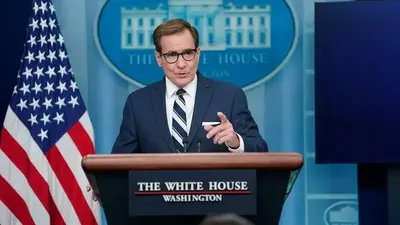Politics
Bipartisan coalition making new push to ban congressional stock trading
A bipartisan group of lawmakers is making a new push to ban members of Congress from private stock trading.
It's an attempt to "demonstrate that lawmakers are focused on serving the interests of the American people -- not their own stock portfolios," Rep. Abigail Spanberger, a Virginia Democrat, said in reintroducing the measure along with Texas Republican Rep. Chip Roy.
After failing to get a floor vote when last introduced in 2021, the "TRUST (Transparent Representation Upholding Service and Trust) in Congress Act," gained increasing support across the political spectrum in 2022 with 75 cosponsors, and its backers say that the number will grow even larger this time around.

The bill would require all members of Congress, their spouses and their dependent children to put "certain assets" into a blind trust at, or sooner than, 90 days after a member is elected, effectively banning them from trading in individual stocks.
Because they could have insider knowledge related to legislation, lawmakers have been the focus of increased calls to restrict their ability to trade.
The controversy resurfaced in 2021 when questions were raised about members, who had gotten closed-door briefings, making trades related to the health care industry ahead of Congress passing major funding to combat the COVID-19 pandemic.

MORE: Pelosi open to banning congressional stock trading after months of resistance
The stock-trading measure gained headway in early 2022 when former House Speaker Nancy Pelosi eventually opened the door to considering a ban -- proposed by some Democrats -- after initially defending members' right to trade stocks. "We're a free-market economy," she said defending her previous resistance, saying a ban should apply across the government.
Still, the bill was never brought to the floor for a final vote.

Current Speaker Kevin McCarthy, who claims he only owns mutual funds and not specific stocks, said last June that if Republicans were to take control of the House in the 2022 midterms and he became speaker, he would "look all the way through" legislation to bar lawmakers from trading stocks.
As House Minority Leader, McCarthy criticized Pelosi for delays taking up the issue, blaming her husband Paul Pelosi's stock trading. "Look, I think the speaker of the House has greater determination of what comes to the floor, what gets out of the committee. And her husband didn't just trade stock, he traded options. I think what her husband did was wrong," he said referring to Paul Pelosi's trading of tech stocks before the passage of the Chips Act.

As it stands now, roadblocks exist to prevent a member from using insider knowledge of legislation to invest in their personal assets, including the STOCK Act. Signed into law by former President Barak Obama in 2012, it marked a rare moment of bipartisanship during that midterm election year.
The STOCK Act requires specified individuals including members of Congress, their families, and staff to file reports after receiving notice of a transaction exceeding $1,000 in stocks, bonds, or commodities futures.
"The STOCK Act makes it clear that if members of Congress use nonpublic information to gain an unfair advantage in the market, then they are breaking the law," Obama said at the bill signing before conceding there was more to do to eliminate the "corrosive influence of money in politics."
But critics say the act lacks accountability and transparency because there is no record of those found in violation or of the penalties for doing so.
"Voters have a right to know whether their elected officials are focused on the needs of the public, or are prioritizing their own personal wealth," said Campaign Legal Center Vice President, Kedric Payne.
This is the third time that Spanberger and Roy have introduced the bill, with the list of original cosponsors growing from 10 in the 117th Congress to at least 37 original cosponsors in the 118th Congress.
"Momentum is growing for our bipartisan bill to ban members of Congress from trading individual stocks," Spangerger said, "The American people want us to get this done."
ABC News' Lauren Peller contributed to this report
-

 Politics3h ago
Politics3h agoWhy Trump Actually Needs Mexico
-

 Politics3h ago
Politics3h agoMan Convicted of Killing Laken Riley Sentenced to Life in Prison Without Parole
-

 Politics5h ago
Politics5h agoAmericans agree more than they might think − not knowing this jeopardizes the nation’s shared values
-

 Politics5h ago
Politics5h agoRed flag laws are still used in Colorado’s Second Amendment sanctuaries, just less frequently
-

 Politics9h ago
Politics9h agoHow the Biden Administration Protected Abortion Pill Access—and What Trump Could Do Next
-

 Politics9h ago
Politics9h agoWhy Trump’s Tariffs Could Raise Grocery Prices
-

 Politics20h ago
Politics20h agoThe First Trans Member of Congress Expected Pushback Like Mace’s Bathroom Rule
-

 Politics20h ago
Politics20h agoNew York Prosecutors Oppose Dismissing Trump’s Hush Money Conviction


























